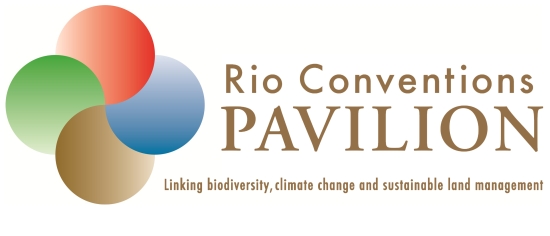Summary of proceedings for Rio Conventions Pavilion UNCCD COP 12 - 21 October 2015: Sustainable Land Management Day
 Wednesday, October 21, 2015 at 01:55PM
Wednesday, October 21, 2015 at 01:55PM
The Soil Leadership Academy started off Sustainable Land Management Day with interactive simulation exercises and a session with delegates to the parliamentarians’ roundtable. Later in the morning, the Restoration Kiosk organized by the World Agroforestry Centre engaged participants with a comfortable atmosphere. This session was led by Ermias Betemariam and Madelon Lohbeck of the World Agroforestry Centre, Chris Reij a Senior Fellow at the World Resources Institute, and other experts. The relaxed atmosphere facilitated informal discussions between restoration scientists and participants concerning the newest tools and methods for the characterization and assessment of land degradation and restoration opportunities. Participants seemed to gather a full spectrum of understanding of restoration from the experts as they chatted with one another and asked pointed questions while pouring over fact-filled brochures.
Over lunchtime Mr. Braulio Dias, Executive Secretary of the CBD, discussed ecosystem-based approaches to climate change adaptation and disaster risk reduction with emphasis on experiences at country and regional level. Fidaa Haddad of IUCN emphasised Jordan’s vulnerability to climate change and how rising temperatures will accelerate desertification through increased evaporation, as well as shrinking groundwater and grasslands. She emphasised the need for concerted legislative efforts to combat desertification. Barbara Thompson, Deputy Minister of Environmental Affairs in South Africa, spoke about the multiple benefits of ecosystem-based approaches to adaptation and pointed out the win-win outcomes of forest conservation and wetland restoration, which contribute to climate change mitigation. If action is not taken, Thompson warned that the impacts would be felt increasingly by communities and economies around the world.
After lunch, the Soil Leadership Academy held its final workshops within its COP12 simulation workshop program launch. Organizational leaders were guided through the decision-making process to achieve LDN in their own country or business, using an interactive simulation tool that enabled them to choose an implementation path catering to their needs, context and priorities. Presentations were made by ELD, Leeds University, CGIAR, FAO, WRI, the Turkish Ministry of Food, Agriculture and Livestock, IUCN and the UNCCD Secretariat.
Thereafter, a networking cocktail reception began the session on scaling up SLM and related investment in Sub Saharan Africa. Findings of the stocktaking of lessons learned from the Terrafrica/Strategic Investment Program (SIP) for SLM were presented and up-scaling of SLM investment in Africa was promoted. Implemented by 26 countries through 36 projects, with 6 multilateral agencies and over $1 billion in financing including GEF support, SIP is now ending. Organized by the World Bank, GEF, NEPAD, and FAO, the event discussed the main outcomes of a recent lessons stocktaking study. Presentations by SLM/TerrAfrica focal points from Burundi, Senegal, and Swaziland explained these countries’ lessons learned, experiences, progress, impacts and opportunities for leveraging a nationwide SLM scaling up process then took place.


Reader Comments